On September 8, 2025, the United Nations called for a swift and clear investigation into reports that Nepal police killed at least 17 people during protests in Kathmandu over a government ban on social media.
Clashes Over Social Media Ban
On September 5, 2025, Nepal banned 26 unregistered social media platforms, including Facebook, YouTube, and X.
This sparked outrage among thousands of young Nepalis, mostly Generation Z, who rely on these platforms for communication and work.
Protesters marched to a restricted area near parliament, breaking through barriers.
Police responded with tear gas, rubber bullets, water cannons, and batons. A police official reported 17 deaths, while Amnesty International and protesters claimed live ammunition was used.
UN Seeks Accountability
Ravina Shamdasani, a UN human rights spokesperson, expressed alarm at the violence. “We’re troubled by reports of excessive police force,” she said.
She urged Nepal to investigate openly and protect the right to peaceful protest and free expression.
Shamdasani also called for police to follow strict rules on force and for Nepal to revise its social media laws to meet human rights standards.
Nepal’s Democratic Test
Shamdasani highlighted Nepal’s lively democracy, saying, “Open talks, not force, should resolve these issues.” The UN encouraged dialogue to ease tensions and ensure protesters’ rights are respected.
Roots of the Protests
The sudden social media ban angered youth who use these platforms for news, business, and connection. The protests also voiced frustration with government corruption, with slogans like “Stop corruption, free social media.”
Next Steps
The UN’s call pressures Nepal’s government to act fairly. As tensions rise, the nation faces a choice: engage in dialogue or risk more unrest. This moment tests Nepal’s commitment to democracy.






